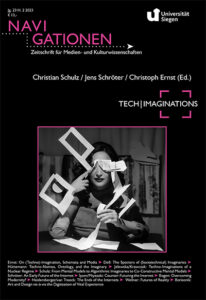 Technologies and especially media technologies are pervasive in modern societies. But even more omnipresent are the imaginaries of modern technologies – what technologies are thought to be capable of or what effects they are supposed to have.
Technologies and especially media technologies are pervasive in modern societies. But even more omnipresent are the imaginaries of modern technologies – what technologies are thought to be capable of or what effects they are supposed to have.
These imaginations reveal a lot of the political and ideological self-descriptions of societies, hence the (techno-)imaginary also functions as a kind of epistemic tool.
Concepts of the imaginary therefore have experienced an increasing attention in cultural theory and the social sciences in recent years. In particular, work from political philosophy, but also approaches from science and technology studies (STS) or communication and media studies are worth mentioning here. The term „techno-imagination“, coined by Vilém Flusser in the early 1990s, refers to the close interconnection of (digital) media and imaginations, whose coupling can not only be understood as a driver of future technology via fictional discourses (e.g. science fiction), but much more fundamentally also as a constitutive element of society and sociality itself, as Castoriadis has argued.
In the first part of the issue several theoretical contributions add new aspects to the discussion of socio-technical imaginaries, while in the second part a workshop held in January 2022 at the CAIS in Bochum is documented, in which the case of the imaginaries of “Future Internets” was discussed.
Navigationen – Zeitschrift für Medien und Kulturwissenschaften, Jg. 23 (2023), Heft 2
TECH | IMAGINATIONS
Christian Schulz / Jens Schröter / Christoph Ernst (Hrsg.)
Siegen: universi 2023, 194 S.
ISSN 1619-1641
Preis: 13,- Euro


